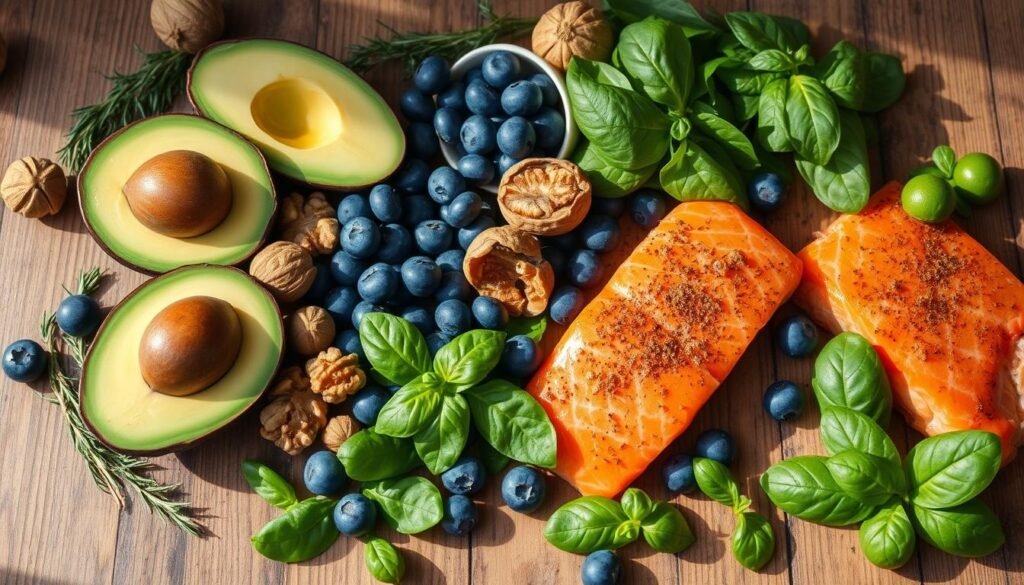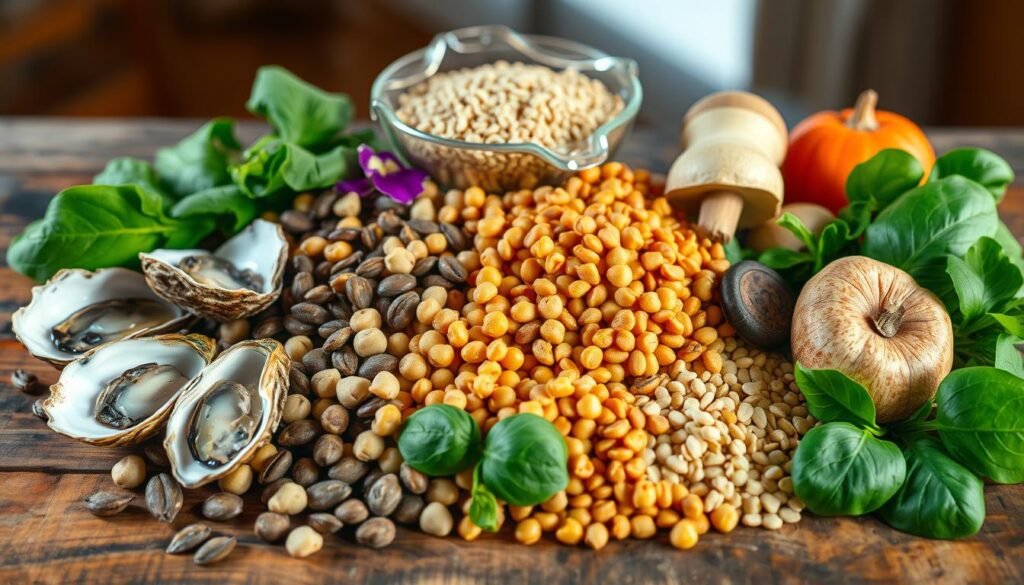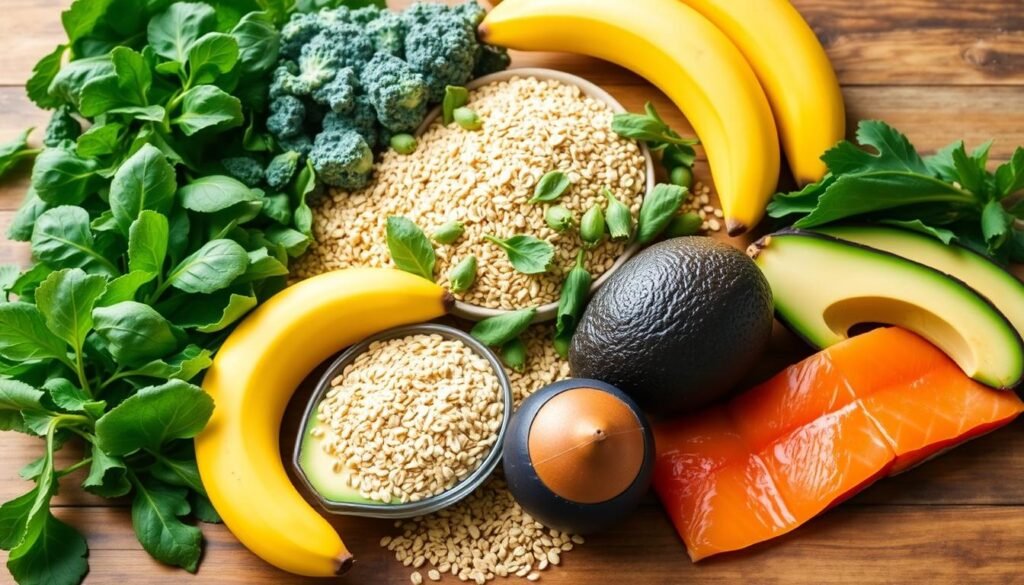Almost half of all people will deal with dandruff at some point. This makes dandruff a common problem, though many don’t take it seriously. To fight dandruff, eating right is key for keeping a healthy scalp. Though no studies prove diet changes can fix dandruff, certain nutritional dandruff remedies support scalp health.
Eating less sugar, unhealthy fats, and processed carbs is a good start. Instead, focus on fruits, veggies, proteins, and essential fats. Foods like eggs and leafy greens, rich in zinc and vitamins, are great for strong hair and a healthy scalp.
Key Takeaways
- A balanced diet is essential for preventing dandruff and promoting scalp health.
- Lowering sugar intake can support overall scalp wellness.
- Foods rich in omega-3 fatty acids help reduce inflammation and promote hair strength.
- Maintaining proper scalp hygiene complements dietary measures for dandruff control.
- Including probiotics in your diet can improve scalp health by strengthening the immune system.
Understanding Dandruff and Its Causes
Dandruff is common and leads to visible flakes and itching on the scalp. It’s often due to the Malassezia fungus, which loves oily conditions. This condition, seborrheic dermatitis, affects almost half of adults worldwide. It is more common in men than in women.
Many factors contribute to dandruff, ranging from oily to dry skin. Skin conditions play a big role too. Dandruff gets worse in colder seasons because of lower humidity. Those with oilier hair or certain health problems, like Parkinson’s or HIV, might see more dandruff.
To keep dandruff away, keeping your scalp clean is crucial. The American Academy of Dermatology Association suggests using special shampoos. Ingredients like ketoconazole or zinc pyrithione help fight the fungus. Natural remedies, like apple cider vinegar, might also help.
If dandruff doesn’t get better, seeing a doctor is a good idea. They can offer special treatments. Knowing about dandruff and its causes helps you fight it better.
Importance of Nutrition for Scalp Health
Nutrition is key to having a healthy scalp, which fights dandruff well. Eating right ensures the scalp gets what it needs to work well. The right vitamins and minerals from good foods help the scalp fight off dandruff.
Important nutrients like zinc, vitamin A, and omega-3s are crucial for scalp care. Vitamin A keeps hair’s pH balanced, stopping dryness and itching. Zinc controls the production of sebum, which keeps the scalp moist. Omega-3 fatty acids, in foods like salmon and avocados, moisturize the skin and lower inflammation.
Eating protein-rich foods like eggs and poultry makes hair strong. This helps prevent hair loss from not having enough iron. For vegetarians, lentils and leafy greens are good iron sources. Eating well is important for healthy hair and helps prevent dandruff.
Adding lots of fruits and vegetables to your diet brings in vitamins and antioxidants. They help blood flow to the scalp and hair roots. It’s also important to drink plenty of water. This stops dryness and keeps the scalp healthy.
To wrap up, nutrition is crucial for scalp health. Here’s a table showing key nutrients and what they do:
| Nutrient | Sources | Role in Scalp Health |
|---|---|---|
| Zinc | Legumes, fortified cereals, whole grains | Regulates sebum production, protects hair and scalp |
| Vitamin A | Carrots, spinach, mangoes | Balances pH value, prevents dryness and itching |
| Omega-3 Fatty Acids | Salmon, walnuts, flaxseeds | Moisturizes skin, reduces inflammation |
| Protein | Eggs, chicken, fish | Strengthens hair, prevents loss |
| Iron | Red meat, lentils, leafy greens | Supports hair growth, prevents deficiency-related issues |
Balanced Diet for Dandruff Prevention
A balanced diet is key for preventing dandruff. Including essential nutrients in your meals helps keep your scalp healthy and reduces flaking. What you eat affects both how your scalp looks and feels. Eating foods high in omega-3 fatty acids, zinc, and B vitamins is important. Look for these nutrients in oily fish, nuts, seeds, and leafy greens.
Essential Nutrients for a Healthy Scalp
Certain essential nutrients are vital for a healthy scalp and less dandruff. Zinc is one such nutrient, found in meat, shellfish, legumes, and seeds. Selenium, another important mineral, supports hair health and is found in brazil nuts, fish, and spinach. Biotin and vitamin B2, which you can get from eggs, avocados, and almonds, also help keep your skin healthy. Eating these foods can greatly improve your scalp’s health.
Role of Hydration in Scalp Maintenance
Staying hydrated is also crucial for your scalp. Drinking enough water helps keep your scalp moist, stopping it from getting dry and flaky. Drink water or herbal teas to stay hydrated. This not only helps your skin but also benefits your overall health. Keeping your body hydrated can help prevent dandruff, showing the important role hydration plays.
Key Anti-Inflammatory Foods
Eating anti-inflammatory foods is key to better scalp health and less dandruff. Foods with anti-inflammatory effects help control conditions like seborrheic dermatitis. This issue gets worse with inflammation and excess yeast.
Eating fruits and vegetables loaded with antioxidants is smart. Think berries, leafy greens, and bell peppers. They fight stress that can harm the scalp. Omega-3s in salmon and avocados lower inflammation. Brazil nuts are good too because they have selenium, which fights inflammation.
Choosing whole foods helps your overall health and cuts down on dandruff-related inflammation. A good diet includes vitamin C from citrus and vitamin A from eggs to strengthen the scalp and hair. Natural options like tea tree oil and aloe vera fight inflammation and fungus, helping with dandruff.
To really tackle dandruff, think about changing your diet and seeking professional advice. For more on how diet affects dandruff, check out this useful guide on nutrition’s impact on dandruff management.

Omega-3 Rich Diet for Hair Health
An omega-3 rich diet is key for hair and scalp health. It provides nourishment that helps with hair growth and fights dryness and dandruff. Adding foods high in omega-3 to your diet can greatly improve the health of your hair and scalp.
Best Sources of Omega-3 Fatty Acids
To keep your hair in top shape, include foods high in omega-3. Top sources include:
- Fatty fish like salmon, mackerel, and herring
- Flaxseeds
- Chia seeds
- Walnuts
These foods are packed with nutrients that nourish the skin, reduce dryness, and promote healthy hair follicles. Always talk to a doctor before trying new supplements, like fish oil, as they may affect other medications. Learn more about fish oil’s benefits for hair here.
Benefits of Omega-3 for Dandruff Control
An omega-3 rich diet can also fight inflammation, reducing scalp irritation and dandruff. Eating foods high in omega-3 helps keep the scalp healthy and supports strong hair growth. This results in better scalp condition and less dandruff.
It’s also crucial to find a scalp care routine that works for you. Experiment with how often you wash your hair to see what suits you best. Tips for customizing your scalp care are available here.
Zinc-Fortified Foods and Their Impact
Zinc is key in keeping our scalp nutrition up to par. It’s vital for those looking to lessen dandruff reduction. This mineral strengthens the skin’s guard against damage. It also fights off harmful microbes, including a fungus that causes dandruff.
Eating Zinc-Fortified Foods is a smart move for better scalp health. Some top zinc sources are:
- Oysters
- Pumpkin seeds
- Beans
- Chickpeas
- Dark chocolate
These options bring more than just zinc to the table. They’re full of nutrients that help keep our scalp healthy. Making them a regular part of your diet will boost skin health and lower dandruff issues.

Lack of zinc has been linked to more dandruff and scalp problems like seborrheic dermatitis. Getting enough zinc from these foods can ease inflammation and foster a healthier scalp. This way, we can both stop and treat dandruff more effectively.
Probiotic-Rich Foods for Scalp Wellness
Foods rich in probiotics are key for good health, including scalp wellness. Many of these foods are fermented, adding good bacteria to our bodies. This helps fight problems like dandruff. For example, people have been making yogurt since about 9000 BCE. Kimchi and sauerkraut have been important in many cultures for a long time.
Probiotics do more than help with digestion; they also benefit our skin and scalp. They help balance the immune system and can cut down on dandruff flaking. Dandruff is often due to too much of the fungus called Malassezia. Eating foods full of probiotics can help keep a healthy balance of bacteria, which might lessen dandruff.
| Probiotic-Rich Foods | Benefits | How They Help in Dandruff Prevention |
|---|---|---|
| Yogurt | Contains live cultures | Restores balance in scalp bacteria |
| Kimchi | Rich in antioxidants | Reduces inflammation, supports scalp health |
| Sauerkraut | High in fiber | Promotes gut health, which reflects on skin |
| Kefir | Contains multiple strains of probiotics | Enhances immune response, combats dandruff |
Adding these probiotic-rich foods to your daily meals can help your scalp wellness and aid in dandruff prevention. Stress also plays a role in our skin and scalp’s health. So, it’s important to look after our mental well-being and what we eat. This is part of taking care of our hair in a whole-body way.
Vitamin B-Rich Foods That Fight Dandruff
A healthy scalp is crucial to avoid dandruff. Getting enough Vitamin B is key. These vitamins are important for skin health and help reduce dandruff symptoms. Eating foods rich in B vitamins boosts hair growth and fights off dandruff.
High B vitamin foods include:
- Eggs
- Fish such as salmon and tuna
- Leafy greens like spinach and kale
- Dairy products like yogurt and milk
- Beans and legumes
- Poultry and lean meats
- Whole grains
- Nuts and seeds
Eating foods high in Vitamin B can lessen dandruff. For instance, Vitamin B6 is key for zinc absorption, which helps control scalp oil. Also, Vitamin B12 improves scalp health and reduces itchiness from dandruff.
Good nutrition and dandruff prevention are closely linked. With a diet rich in B vitamins, you can better manage dandruff. It’s also smart to have a hair and scalp care routine along with this diet.

| Vitamin B Type | Sources | Benefits for Scalp |
|---|---|---|
| B6 (Pyridoxine) | Bananas, chicken, potatoes | Helps with zinc absorption; reduces scalp irritation |
| B12 (Riboflavin) | Fish, meat, dairy | Supports healthy hair growth; prevents dryness |
| Folates | Leafy greens, beans, citrus | Promotes blood circulation; nourishes hair follicles |
Adding Vitamin B-rich foods to your meals can make your scalp healthier. This is a great start to control dandruff.
Low-Glycemic Diet: A Less Inflammatory Approach
A low-glycemic diet focuses on foods that keep blood sugar stable. It helps reduce body inflammation, vital for those fighting dandruff. It restricts foods that cause quick insulin spikes, aiding those with dandruff issues.
Adding anti-inflammatory foods is key in this diet. It includes whole grains, legumes, vegetables, and many fruits. These items promote a healthy scalp by reducing oil and flakes. About 11% of people are affected by seborrheic dermatitis (SD), and diet plays a role in managing it.
Research shows diet affects scalp health. Those eating refined carbs like white bread reported more dandruff. In contrast, eating non-acidic fruits, leafy greens, and raw nuts can lower inflammation and improve the scalp.
| Food Type | Glycemic Impact | Potential Benefits for Dandruff |
|---|---|---|
| Whole Grains (Oats, Quinoa) | Low | Rich in antioxidants, supports overall scalp health |
| Leafy Green Vegetables | Low | High in vitamins, aids in reducing inflammation |
| Legumes (Beans, Lentils) | Low | High protein, promotes healthy hair growth |
| Fruits (Berries, Apples) | Moderate | Rich in vitamins and minerals, supports immune health |
| Raw Nuts (Almonds, Walnuts) | Low | Provides healthy fats, anti-inflammatory properties |
Switching to a low-glycemic diet with these foods improves scalp health. It aligns with overall health and helps manage dandruff.
Conclusion
Adopting a balanced diet is key to preventing dandruff and improving scalp health. It’s a crucial strategy many people use during their lives. After all, dandruff affects half the world’s adults, showing the need for good solutions.
Eating anti-inflammatory foods, rich in omega-3 fatty acids, helps the scalp stay healthy. While changing your diet won’t cure dandruff alone, it supports treatment. Those with dandruff notably benefit from a nutritious diet, seeing symptom improvements.
For fighting dandruff, mix good nutrition with proper hair care and stress management. Consulting health experts when needed is also wise. This complete approach, grounded in strong nutrition, fights dandruff well and ensures lasting scalp health.